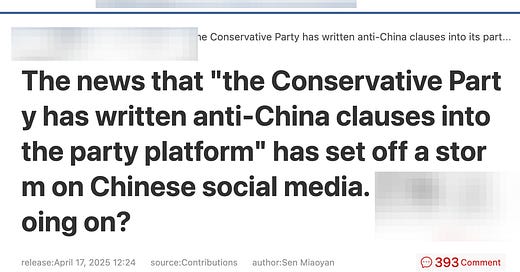PRC-Linked Disinformation Claims Conservatives Threaten Chinese Diaspora Interests, Aims at PM Carney’s Debate Remark
MARKHAM, Canada — As polls tighten in Canada’s pivotal federal election, a Chinese-language website has published multiple editorials suggesting that a Pierre Poilievre government could threaten Chinese Canadian interests with so-called “anti-China” policy clauses—claiming it could bring “inconvenience to the lives of Chinese people, such as restrictions on the use of social media, reductions in return air tickets, etc.”
During the 2021 federal election, then-Conservative leader Erin O’Toole and MP Kenny Chiu were widely attacked with similar arguments across Chinese-language news and social media. CSIS reporting from 2022, cited exclusively by The Bureau, warned that Chinese-language media in Canada is effectively controlled by Beijing and weaponized during election periods to spread Chinese Communist Party-aligned narratives.
One of the new articles also criticizes Prime Minister Mark Carney’s debate remark that Beijing poses the greatest threat to Canada’s national security—a comment that prompted the Chinese-language editorial to question whether Carney’s statement was “a gimmick to attract attention.”
The articles, published Thursday and Friday by 51.ca, have raised deep concern among some community members. One longtime Chinese Canadian journalist, who requested anonymity due to fear of retaliation, told The Bureau they were alarmed by the messaging and suspected the coverage was driven by election-interference motives.
One of the pieces claimed that “the Conservative Party has written anti-China clauses into the party platform,” referencing a prior story that quickly circulated on Chinese-language social media and triggered fearful discussion.
Citing WeChat commentary on the same article, the journalist pointed specifically to a politically connected figure previously associated with CSIS investigations into election interference networks in the Greater Toronto Area—allegedly tied to clandestine funding channels linked to the Chinese Consulate in Toronto.
Sharing a WeChat forum screen-picture, the diaspora journalist noted:
“The writer said, according to the Conservative’s campaign platform, China’s definition is ‘enemy.’ So what is the impact on Chinese Canadians’ daily life? Facing more discrimination? Fewer flights going back to China? How about using social media? If there is a war, what will happen to Chinese Canadians—like Japanese people were sent to the concentration camps or deported?”
The journalist said the messaging is not only inflammatory, but dangerously manipulative—casting the Conservative Party as a threat to the civil rights and safety of Chinese Canadians, while exploiting historical trauma to provoke fear.
The same 51.ca article—while quoting from the Conservative Party’s platform documents—shifts sharply into misleading commentary. It contrasts the party’s current positions with historical discrimination enacted by the Liberal government of the 1920s.
One of the recent 51.ca articles warns that the Conservative Party’s stance “can easily cause ethnic tensions and even exacerbate anti-China sentiment.”
A second article delivers a similar critique of Conservative policy while also taking aim at Prime Minister Mark Carney, who, in last night’s nationally televised debate, stated:
“I think the biggest security threat to Canada is China.”
That comment, consistent with assessments from Canadian intelligence services and allied Five Eyes partners, was immediately seized upon by 51.ca’s editorial board.
“Carney blurted out that China is Canada's biggest threat. Is this a deep-rooted idea or a gimmick to attract attention? It is not known yet. But what is certain is that when other party leaders are talking about how to deal with the problems facing Canada itself, Carney is talking about China being the enemy. I really don't know what's going on in his mind.”
Both 51.ca articles strategically focus their sharpest criticism on the Conservative Party, portraying its platform as existentially dangerous, while the second treats Carney’s one-line debate comment as a moment of rhetorical overreach.





The Chinese government seems to have deep ties with the Liberal government, and has a lot of influence in Canada.
Many thanks to the journalist mentioned for their willingness to expose this content to the broader public. As with other types of threats, whether internal or external, it's often members of the communities concerned speaking up for what is right that make a crucial difference in the surrounding public debates, especially in tolerant and diverse Western societies fearful (rightly so, to an appropriate degree) of creating an environment where any particular contingent of the population may be made subject to unwarranted general suspicion; an avoidance or refusal to take a stand on such critical issues speaks for itself, though it must be conceded that potential threats to family in a country of origin, or even to one's own wellbeing in this country by foreign police force personnel and other extralegal associated operatives, would be a powerful motivator to keep silent.